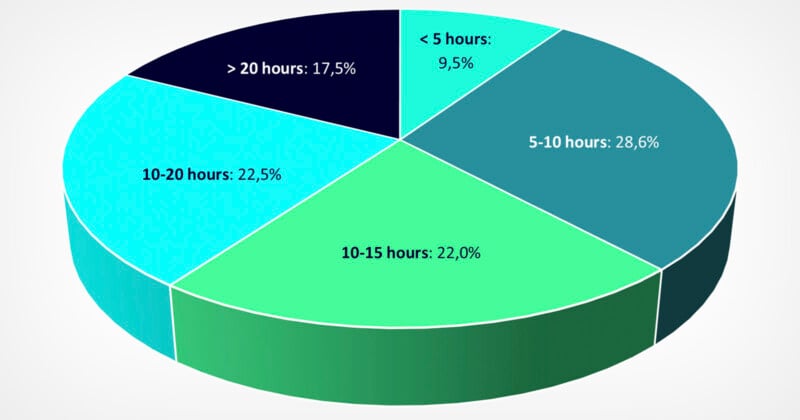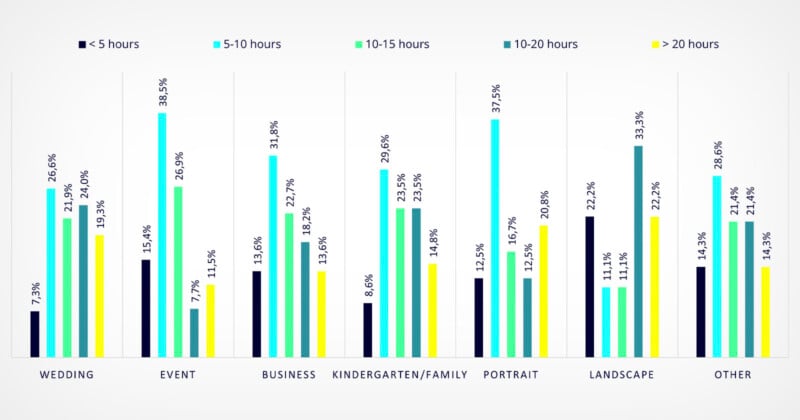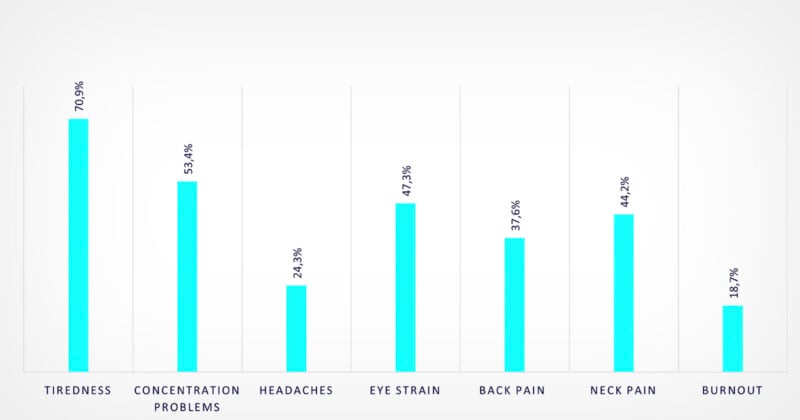![]()
A study looking at how long hours spent editing images affect the well-being of photographers has found that 50.4 percent suffer from mental exhaustion after a lengthy editing session.
The study was carried out by Neurapix — an AI editing platform that learns a photographer’s style and applies it to batch edits — and found that out of the 423 photographers surveyed most of them spent five to 10 hours per week editing (28.6 percent). 9.5 percent spent less than five hours per week, 22.5 percent spent 10 to 20 hours per week, and 17.5 percent spent over 20 hours per week.

How much editing a photographer does is dependent on the work they do, for example, about a quarter of wedding photographers say they spend 10 to 20 hours per week editing, and one in five spend over 20 hours. School and family photographers spend a similarly long time editing but the group with the biggest proportion of 20-hour plus editing per week is landscape photographers with 22.2 percent.

The study also looked at psychological pressure and mental exhaustion. Over 90 percent of photographers say they feel “generally” under pressure with the most common reason being deadlines or time constraints. Large workloads, client inquiries, and personal conflicts were all contributing factors to photographers feeling the heat.

Pressure is particularly felt by photographers who are just starting out (in the first to three years of business), only 12.5 percent of respondents from that group reported feeling no pressure. Conversely, 44.9 percent of photographers with over a decade of experience say they feel no daily pressure but have other bugbears such as client inquiries.
Blossoming photographers cited personal disputes as the most common cause of stress which apparently decreases as experience grows. All other levels of experience cite deadlines and time pressure as the biggest pressure triggers.

All the hours spent editing in front of a computer can lead to health issues, 70.9 percent of respondents cited fatigue as their main concern followed by difficulties concentrating (53.4 percent), eye strain (47.3 percent), and neck pain (44.2 percent). Other health issues mentioned include back pain (37.6 percent) and headaches (24.3 percent).
Around one in five of the photographers in the survey said they have sought medical assistance with the highest rates in the business (33.3 percent) and family (32.9 percent) photography group.
Skin in the Game
Any photographer who has undertaken a large editing job will attest that spending hours and hours in front of the computer making tweaks to hundreds if not thousands of images is tough going.
It’s what makes this study interesting but it is worth noting that the company who conducted it, Neurapix, has a specific interest in this because of its software which uses AI technology to batch edit images in the photographer’s style, therefore saving editing time.
To that end, the study says 61.7 percent of the respondents are using AI in their editing with more photographers from the younger generation deploying AI on their work.
The full study can be read here.
Image credits: Neurapix
